
Mime Spoken Here - Excerpts
Click below to jump to an excerpt:
--On Technique and Artistry
--On Premise
--Bringing a Character to Life
--On Improvisation
--On "Stage Nerves"
On Technique and Artistry
Technique is impressive. Artistry is interesting.
"Impressive" alone does not stand the test of time. The next guy comes along and is taller than you, more accomplished, quicker, wealthier, busier. "Impressive" is based on relatives: more or less, better or worse, etc.
"Interesting" stands alone. When something is interesting, time stops, comparisons are irrelevant.
Technique and artistry evolve together as long as the primary motivating force behind one's effort is enthusiasm. Enthusiasm overrides the lesser motives that might hamper progress. (Incidentally, the word, enthusiasm, is derived from the Greek [en, in + theos, god]. Enthusiasm means "in God.")
Only the ego can interfere with enthusiasm. Emotions such as frustration, doubt, envy, anxiety, resentment, and blind ambition are offspring of the ego; even the most subtle hint of these emotions undermines progress and divides the artist against him or herself. Technique may still improve under ego-stress, but artistry is absolutely blocked. The schism between technique and artistry begins here.
The finite ego is that which believes it is separate-separate from the other students in the class-separate from the teacher-separate from the audience-separate from one's subject matter. These separations are illusions. The finite ego also uses technique as a short-cut to greatness and neglects the issue of artistry altogether. In fact, technique and artistry are not separate issues; they are two sides of the same coin.
"Something there is that doesn't love a wall,
That wants it down . . . ."
-from "Mending Wall," by Robert Frost
Over the past forty years, I have developed a style of teaching that stresses the importance of watching and training the mind. The body is used as a monitor to check whether one's thoughts are correct, but the external appearance of the body is never considered the ultimate authority in determining whether something is "good" or not. I teach this way because very early in my career, I noticed that the body lies quite a bit. For example, I'd see mimes doing beautiful, impressive work with their bodies, but I couldn't believe their performances. Or I'd see mimes with remarkably unaesthetic bodies doing wonderful, convincing characters. These performances were so captivating that the physical "flaws" disappeared within seconds of their opening moves.
I found that I much preferred watching the unaesthetic body as long as I could believe the work and identify with what I was seeing. Instinctively, I decided that honesty and believability were the most important elements comprising the art of mime. But the raw elements of artistry are worthless if the mime lacks the technique to carry them across to an audience. Therefore, since my first day of teaching, my objective has always been to develop the elusive qualities of believability and honesty in my students and to treat technique as a vehicle rather than an end in itself. My exercises and my style of teaching have evolved from this main objective, and my students (a great many of whom now have successful performing careers) attest to the effectiveness of this approach to the art and technique of mime.
back to top of page
On Premise
"Premise work is a way of becoming conscious of a natural process that before was unconscious.
Premise work makes you aware of the natural cause-and-effect law governing your life. In life, desire always precedes the fulfilling of a desire. A motive (unconscious?) always precedes an act. A premise always precedes a conclusion. A cause always precedes an effect.
If you want to see premise-in-action, watch a baby learning to walk or trying to get something. The baby's body is entirely relaxed and the only force operating on that body is the premise (i.e., the baby's intent to walk, get something, eat). You see the principle of premise operating in babies to bring about coordination and strength.
In adult life too, premise dictates our actions and movements. When we want a glass of water, say, we open the cupboard, take a glass, turn on the water, fill the glass, and drink with absolute ease. We don't think about our actions; we're concerned only with the cause of those actions (our thirst).
In life, there is no separation between premise and behavior — intent and action. This is the law that makes the psychological gesture an invaluable tool for the actor/mime. Behaving like Hamlet can and will generate hamlet's character (his personal premise) if you let that behavior "get to you."
The only difference between life and stage is that in life, the average person is unaware of the premise and unaware of the process whereby the premise controls his/her thoughts, words, and actions..."
back to top of page
Bringing a Character to Life
Life is synonymous with self-expression. "Being alive" means "being expressed." This is the character's dilemma. The character has no life of its own; it can't express itself. It needs your life in order to express itself. A character needs your mind in order to think, your lungs in order to breathe, and your body in order to move. Likewise, if you don't give the character your mind, breath, and body, you won't know how to express yourself as this character.
Paradoxically, when you do not loan all of yourself to your character, you have to treat your character as a separate entity and speculate on his/her feelings, thoughts, and behavior. While you're busy speculating on your character's behavior, you can never move and speak spontaneously. But if you "give in" to your character, if you let the character "get to you," then the correct thoughts, words, and actions will occur to you, as if by magic.
These are the terms of the actor/character alliance. If they are met, everyone is happy. The character comes to life and reveals new things to you about you. You, in turn, are shown off to your advantage. The audience is happy because they thoroughly believe you, your performance, and your character.
Character work is not the simple imitation of effects (i.e., facial expressions, mannerisms, and affectations). It's not a matter of memorizing a few mug-shots and gestures and then reproducing these on stage. If it were this, then every mimic and every impersonator would be a brilliant artist. In order to play a character convincingly, you must get to know your character so well and so intimately that the audience can't tell where your life ends and your character's life begins. Character work is an exercise in empathy.
empathy - 1. The attribution of feelings aroused by an object in nature or art to the object itself, as when one speaks of a painting full of love. 2. Understanding so intimate that the feelings, thoughts, and motives of one are readily comprehended by another.
-American Heritage Dictionary
The practice of empathy brings the performer, the audience, and the subject matter together into one life, one moment, one event. When you know what true empathy is and how to practice it, you will discover that there is really no separation between you, your character, and the audience.
Perhaps you've heard a fantastic singer on the radio, and his/her performance first incites you to think, "What a wonderful voice!" In my estimation, that performance has not been successful.
Edith Piaf, on the other hand, has a wonderful voice, but this is not the first thing I hear when she sings. I hear Paris, romance, earthiness, the pain and rapture of being in love, and then, I think, "What a wonderful voice!" I can think this now because she has touched me personally. I haven't noticed that she is a superior human being or that she's separate from me in any way. A great artist reminds his/her audience that we're all participants in the same life.
Acting is not a schizophrenic experience. You're not being possessed or manipulated by various characters. When you practice empathy, you find that you can play Adolf Hitler just as convincingly as you play Albert Schweitzer. Your judgement of your characters and your personal preference of one character over the other can be consciously suspended whenever you want them to be. This ability to empathize with all of humanity at will paradoxically gives you profound sense of your own identity. You realize that you can choose who-you-are.
Empathy is the conscious yielding to a character's belief system and your conscious subjection to the laws of that system. But since this is a conscious decision and not some blind emotional impulse, you can never be tricked into doing the unconscionable. Once your sketch is over, the need for your characterization is over and you are no longer subject to your character's point of view.
back to top of page
On Improvisation
"I disagree with the notion that improvisation is an exercise in free association. Free-associative improvs are random, haphazard. They stay on one level. They often don't build, escalate, or resolve. They often don't reveal anything or challenge anyone. Improvisation (as I teach it) is a probing, accumulative, and high-risk expedition into the unknown.
The word "improvisation has the word "improve" in it. Improvisations must go somewhere. They must improve. They should never be monotonous or "safe."
Some people believe that improvisations are field days for the uninhibited. This belief attracts some wild and insensitive personalities to improv sessions while it repels the more serene and complacent types. But, the every-man-for-himself attitude is not in keeping with the spirit of improvisation. When someone "let's loose" during an improvisation, this usually means that he or she has become oblivious tot he present moment. An improvisation should never be out of control or physically dangerous for anyone. Improvisation, approached correctly, teaches acuity, perceptiveness, and presence-of-mind. Blind abandon and bald inhibition have nothing to do with improvisation.
Most people think of improvisation as a theatrical exercise. I see it as an exercise in self-revelation that often yield stage-worthy results..."
back to top of page
On "Stage Nerves"
"Performing may be scary or exhilarating, frustrating or satisfying, but always it is a confrontation with the unknown.
Heading over to the theatre for an eight-o'clock curtain, you can never be quite sure how the next few hours will unfold. Your nerves are on edge. Nowhere and at no time is the novelty of every moment more apparent than when you take your place on stage and wait for the curtain to go up. At this moment, you are keenly aware of the "foreseen" and the "unforeseen." And the minute you step out on stage, you are almost bowled over by the power of that moment, the thrill of being the center of attention. Everyone, the audience as well as the performers, feels the significance and the intensity of this moment.
So what do you do if you are petrified? What do you do if your confidence is on low-ebb that night? Or if your energy level is waning? These are questions every performer asks at one time or another.
When I remember my reasons for performing, much of the fear of taking center stage turns to excitement. Performing is a lesson of living. All of live is new every second. The unseen and the unforeseen surrounds us every second of the day. Therefore, when you go on stage, you should know that you are confronting reality. The intensity of this moment on stage will (if you let it) reveal you to you. This should be your reason for performing. You are learning about yourself and how you articulate with the world. The audience is a metaphor for the rest of humanity..."
Return to Top of Page
Return to Mime Spoken Here Book Page
Return to Store Page

CLICK HERE
Karen's Public Speaking Program

New Promo Pics Click Here!
Photocredit: George C. Anderson
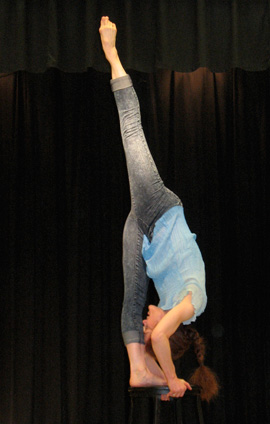
A Visit to Sanford (News Article)
Photocredit: Argy Nestor

Bringing Magic (News Article)
Photocredit: Times Record
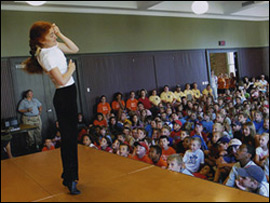
School Assemblies Click Here!
Photocredit: The Sun Journal

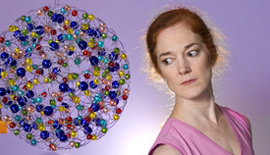
A Dance To Touch The Soul
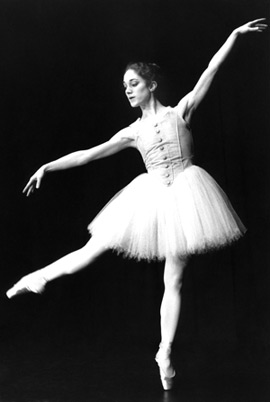
Concerts CLICK HERE!

Workshops CLICK HERE!
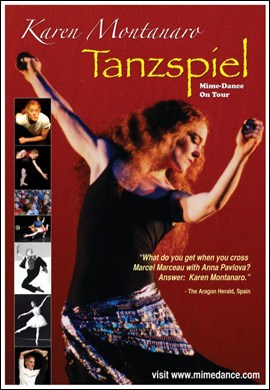
Presenter Resources CLICK HERE!
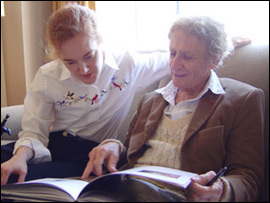
Karen with Marcel Marceau
Read More in "Backstage"